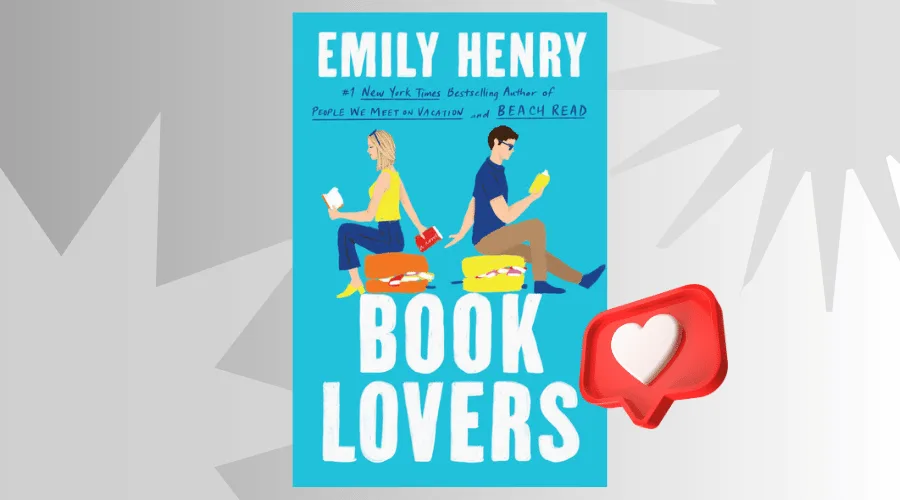Book Lovers is a contemporary romance novel that centers on Nora Stephens, a driven literary agent who thrives in the bustling city of New York. Known for her no-nonsense attitude and success-driven mindset, she’s the antithesis of a typical small-town romance heroine. However, when her sister, Libby, persuades her to take a vacation in the idyllic town of Sunshine Falls, Nora unexpectedly crosses paths with her professional rival, Charlie Lastra, a grumpy book editor. The novel explores themes of family, self-discovery, and love.

| Aspect | Details |
|---|---|
| Author | Emily Henry |
| Genre | Contemporary Romance, Women’s Fiction |
| Main Themes | Family responsibility, self-acceptance, ambition vs. love, breaking romantic clichés |
| Setting | Sunshine Falls, North Carolina, and New York City |
| Writing Style | Witty, heartfelt, and emotionally resonant with sharp dialogue and vivid imagery. |
| Spice Level | Moderate – features a few steamy but tastefully written scenes. |
| Target Age | 16+ (due to mature themes and language). |
| Trigger Warnings | – Death of a parent (mentioned in backstory). – Themes of abandonment and familial sacrifice. |
Book Lovers Summary
Nora Stephens is a powerhouse literary agent known for her sharp instincts, perfectionism, and love for all things urban. She thrives in the bustling world of New York publishing, where her fast-paced life suits her perfectly. Nora’s entire identity revolves around her career and her role as a protector for her younger sister, Libby. Having lost their mother at a young age, Nora stepped into a caretaker role, sacrificing her own desires to ensure Libby’s happiness.
When Libby suggests a month-long vacation to the small town of Sunshine Falls, North Carolina, Nora reluctantly agrees. Libby envisions the trip as a chance for them to reconnect and for Nora to experience the kind of life she reads about in her clients’ books—charming small towns, unexpected romance, and life-changing epiphanies.
Upon arriving in Sunshine Falls, Nora is unimpressed by its sleepy charm and quirky locals. Her skepticism grows when she runs into Charlie Lastra, a book editor she once pitched a manuscript to in New York. Their prior encounter was frosty—Charlie had curtly rejected the project. Now, seeing him in this tiny town feels like an unwelcome coincidence. Charlie is just as brusque and serious as Nora remembers, but as they continue to cross paths, their shared sarcasm and love for books create an unexpected connection.
As Nora tries to embrace the slower pace of Sunshine Falls, Libby encourages her to step out of her comfort zone. They create a checklist of “small-town experiences” for Nora to complete, including attending a local festival, baking, and going on a date with a local man. While Nora begrudgingly participates, her encounters with Charlie grow more meaningful. Beneath his gruff exterior, Nora discovers a man who is deeply loyal to his family, passionate about storytelling, and surprisingly vulnerable. Their chemistry intensifies, and what starts as verbal sparring develops into a simmering romance.
Meanwhile, Nora becomes increasingly concerned about Libby. Her sister is unusually secretive and seems to be hiding something. As Nora digs deeper, she realizes Libby is grappling with her own struggles, including the pressures of being a mother and her desire for a simpler life. Libby’s plan to move her family to Sunshine Falls reveals her wish to build a future far removed from New York—a decision that forces Nora to confront her role in Libby’s life and the sacrifices she’s made for her sister’s happiness.
The novel reaches its emotional peak as Nora faces a choice: should she continue to play the role of the responsible older sister, prioritizing others over herself, or can she finally pursue what she wants—even if it means letting go of some control? Similarly, her relationship with Charlie challenges her to consider if she can reconcile her career ambitions with love.
In the end, Nora and Libby come to an understanding. Libby decides to settle in Sunshine Falls with her family, finding the peace and simplicity she craves. Nora, however, stays true to herself and returns to New York. She realizes she doesn’t have to change her identity or give up her fast-paced career to find happiness. Charlie, who also loves the city, follows her, and they decide to build a life together that aligns with both their ambitions.
Book Lovers: Characters
- Nora Stephens: The protagonist, a sharp and ambitious literary agent who prioritizes her career and family.
- Charlie Lastra: A grumpy, quick-witted book editor with a hidden tender side. Nora’s romantic interest.
- Libby Stephens: Nora’s cheerful and slightly enigmatic younger sister, whose needs and desires play a significant role in the story.
- Secondary Characters: Sunshine Falls’ quirky residents add charm and provide a backdrop for Nora’s growth.
Book Lovers Review
Emily Henry crafts a witty, heartfelt romance that’s as much about familial love as it is about romantic connection. Nora and Charlie’s dynamic crackles with chemistry, and their banter is a highlight of the novel. The book also shines in its portrayal of sibling relationships, with Nora and Libby’s bond anchoring the emotional depth of the story. The mix of humor, poignant moments, and rich character development makes Book Lovers a standout in contemporary romance.
Pros
- Engaging Characters: Nora is a refreshingly unapologetic career woman, and Charlie is a well-rounded, nuanced love interest.
- Witty Dialogue: The banter between Nora and Charlie is sharp and endlessly entertaining.
- Complex Family Dynamics: The bond between Nora and Libby adds emotional weight and depth to the story.
- Breaking Tropes: The book subverts traditional romance tropes by celebrating ambition and individuality.
- Relatable Themes: The struggles of balancing family, career, and personal happiness resonate with many readers.
- Humor and Heart: The book masterfully blends laugh-out-loud moments with tender, heartfelt scenes.
Cons
- Predictability: While enjoyable, some plot points follow familiar romance beats, making the ending somewhat foreseeable.
- Small-Town Elements: Nora’s checklist of small-town experiences can feel clichéd at times, even as the book critiques such tropes.
- Pacing Issues: Some readers may find the story slow in the middle, especially during moments focused on the small-town setting.
- Limited Side Character Development: While Nora and Charlie are well-developed, some secondary characters, like the townspeople, feel underexplored.
This balanced approach highlights the strengths and acknowledges the potential drawbacks, giving readers a clear sense of what to expect.
Book Lovers Ending Explained
The ending of Book Lovers by Emily Henry ties together the themes of family, ambition, and love, while subverting typical romantic tropes by allowing the characters to stay true to themselves.
Nora’s Realization
Nora spends much of the novel torn between her responsibility to her sister Libby and her own desires. Her protective instincts, stemming from the loss of their mother, have made her prioritize Libby’s happiness above all else. However, by the end, Nora realizes that Libby doesn’t need her to constantly sacrifice for her anymore. Libby is ready to carve out her own life and make her own decisions, including moving her family to Sunshine Falls permanently. This revelation allows Nora to let go of her guilt and redefine her role in their relationship, creating space for her own happiness.
The Romantic Resolution
Nora’s relationship with Charlie evolves into a deep connection based on mutual respect and understanding. Both characters are ambitious and career-driven, thriving in the fast-paced environment of New York. Unlike many romance novels where characters give up their dreams to be together, Book Lovers takes a different approach. Rather than Nora abandoning her city life to settle in Sunshine Falls, or Charlie permanently staying in his hometown, they choose to be together in New York—a place where both can flourish without compromising their ambitions. This decision reinforces the book’s message that love doesn’t require sacrificing one’s identity.
Libby’s Journey
Libby’s arc is equally important to the story’s resolution. Her desire to move to Sunshine Falls represents her quest for a simpler, quieter life where she can focus on her family. Nora initially struggles with this choice, fearing it signifies a rift between them. However, Libby reassures her that their bond will remain strong, no matter the distance. This moment allows both sisters to embrace their individual paths while maintaining their close relationship.
Conclusion
The novel ends on a hopeful note, celebrating the idea that love, whether familial or romantic, is about supporting each other’s goals and growth. Nora and Charlie’s relationship thrives in New York, while Libby finds contentment in Sunshine Falls. The ending also subverts the small-town romance trope by affirming that happiness doesn’t have to be tied to a specific setting—it’s about finding the life that fits you.

